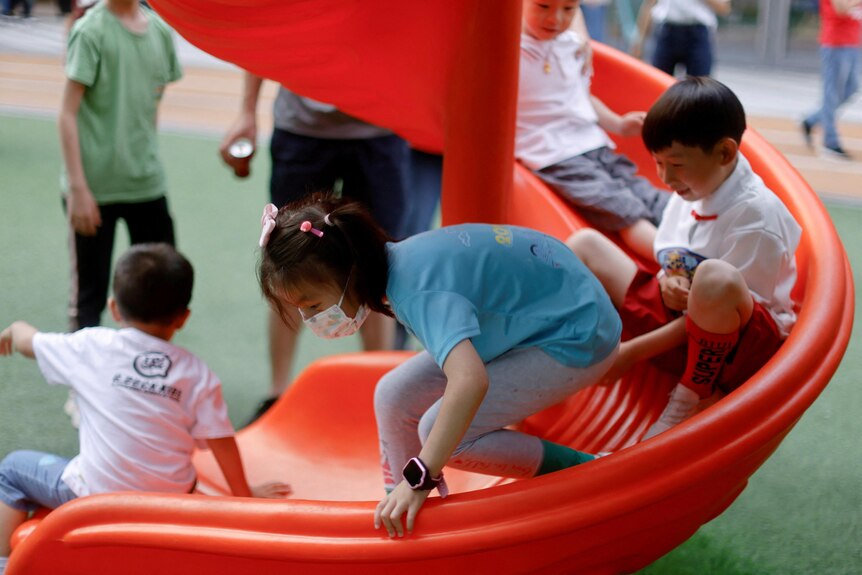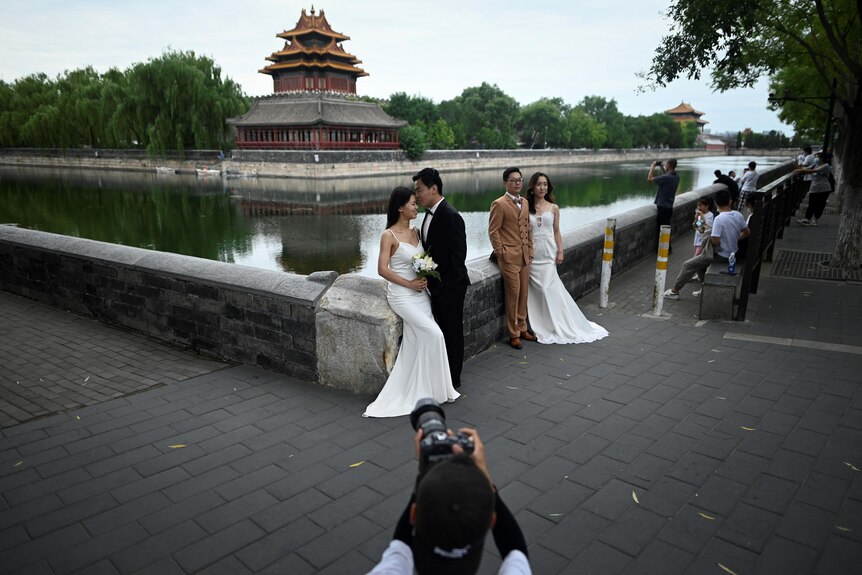- Beranda
- Berita Luar Negeri
Chinese women face a complex homecoming after studying in Australia
...
TS
haaaiya
Chinese women face a complex homecoming after studying in Australia
[url=https://www.abc.net.au/news/2022-09-23/chinese-women-face-aS E N S O Rplex-homecoming/101442550]Chinese women face a complex homecoming after studying in Australia[/url]

Associate professor Fran Martin says studying abroad can offer an "escape route" from gender stereotypes and expectations in China.
When Li Fang* returned to China after studying at university in both Australia and New Zealand, she didn't think she'd changed all that much.
But her family and friends soon noticed.
"People around me thought I was different," she says.
"I asked them, 'What's the difference?' They said, 'Sometimes your opinions and your speaking style are very direct.'"
In hindsight, she agrees. "I think my personality changed a lot after going abroad. I like freedom, I like independence," she says.
It was not only those close to her who noticed. After Li got home, she undertook an internship with the Chinese government.
"No-one [in my office] had an international background … The Chinese style in government is: Everyone is quiet and no-one should speak [up] about anything. Everyone just follows," she says.
"When you come back to China and you're not used to this, people around you think you're strange."
Li is not alone. Many Chinese international students — particularly women — find themselves changed after studying in Australia.
And many of these young women are determined to chart a new course for themselves back in their home country.
Young women 'pivot or reorient' in Australia
Fran Martin, associate professor at the University of Melbourne, recently completed a five-year study where she followed a group of 56 Chinese women who studied at university in Australia, including Li.
"Women students make up a majority of the students who come to us from China," Dr Martin tells ABC RN's Counterpoint.
"Many of them find a very meaningful experience, in terms of their personal, subjective sense of themselves and for their plans in their life as women.
"[They may] pivot or reorient as a result of being away from social and familial surveillance at home and living somewhat independently here in Australian cities."

Many of these young Chinese women feel pressured to accept more traditional roles once they get home.
Dr Martin says many participants spoke about "getting a kind of tolerance or understanding of non-standard ways of living".
"Whether or not you do these yourselves [or see others do it], from dyeing your hair blue, to cohabiting with partners before marriage, to not having a standard 'wife and family' life plan."
But she says these new ideas and values often collide with a more conservative reality back in China. They experience this when returning to the family home, or through broader state and cultural pressures, or both.
"Although many of our graduates would dearly love to maintain that independent lifestyle and independent ways of thinking about what they should do in their adult life."
Often this is most acute with expectations around marriage and children, she says.
'When are we getting grandchildren?'
After countless interviews during her five-year study, Dr Martin says these women face a clear contradiction when they get home.
"The general Chinese public culture and the parent culture has encouraged them strongly towards professional careers and a high level of education … But then there is renewed and intense pressure on women in their mid 20s to reorient suddenly towards marriage, children and family care."
She says these women come back with valuable degrees, "but then they're thrown back into that sort of neo-traditional sense of what a woman's role and identity should be as she moves through that part of her life".
"They may find that they're quite competitive for some professional jobs. At the same time, at least some members of their family and extended family will say, 'When are you getting married?' or 'When are we getting grandchildren?'"

Raising a child in China's bigger cities can be extremely expensive.
As China pushes for its people to have more children, this pressure has increased.
"Even having one child in a metropolis like Beijing, Shanghai or Guangzhou, it's so expensive to care for that child and give them [certain] educational opportunities," Dr Martin says.
"[There's now] the state and public culture saying, 'Why don't you have three children.' It's infuriating for a lot of women who've studied abroad to go back and face that kind of pressure."
Dr Martin adds that there are some conservative voices in China that criticise young women who have studied abroad.
"There are stereotypes in some of the online forums saying, 'Well, would you marry a woman who's come back from studying in the West? Or would she be corrupted by the loose sexuality that we see in Western cultures?'"
A 'leftover lady'
Li completed a master's degree in Melbourne and then started a PhD in New Zealand. She's been back in China throughout the COVID-19 pandemic. Her next steps are up in the air — and she's happy with that.
She says although her parents are "more open-minded" than others, there are definitely broader societal expectations and pressures around marriage.
"People think a woman should be married at the age of 25 or 26," she says.
Li is now 29 and says some people may think she's becoming "a leftover lady".
"But it's very difficult for me to get married, because I still don't know what city I will stay in," she says.

Couples pose for pre-wedding pictures outside the Forbidden City in Beijing.
Li says returned international students have "high requirements"for partners as they "want to find a boyfriend who has not only stayed in China — but has also had a similar overseas experience".
While she didn't want to make direct comparisons with women's rights and gender equality in Australia, she says "a lot of Chinese women … often will give up their jobs when they get pregnant".
But her one specific observation of Australia around gender is about men.
"In Australia, you see many, many dads … that have the baby with them," she says.
"But in China, it's still women who should bring up the children … It's traditional — the man should earn the money and the woman should bring up the children and do everything for the family."
Work-life balance
Li says one of the biggest challenges is negotiating professional opportunities and expectations back home.
"In China, it's so hard to achieve a work-life balance."
She adds that the professional competition "is very, very strong", particularly in the larger cities.
"To be honest, in Australia and New Zealand, the lifestyle is very slow and there's not as big [a] competition," she says.
"So many, many students return from Australia and New Zealand to China and they cannot easily adapt to these things."

After spending time in Australia, some returned students struggle with China's work-life balance.
Li says as a result, some returned international students decide to go abroad again, either for a temporary or more permanent move.
"They think, 'I need to try to find a better life,'" she says.
"China is not good because there's such strong competition and you earn very little money."
Women's voices
Despite the ongoing expectations and pressures, Fran Martin says many of these women "won't simply roll over".
"[Among these] young, educated, urban, middle-class women, there's a strong current of popular feminism running through their way of thinking — they speak to each other, they find ways of thinking and acting differently," she says.
Although there are restrictions across Chinese social media, different opinions about gender are not shut down. These debates and discussions are starting to permeate into popular culture, such as TV shows.
"So while they do face stereotypes and contradictions, [these women] also have agency. They're quite able to exercise that, insofar as they can within the constraints they face."
There are signs that strict ideas around women are slowly changing as the average age of first marriage is rising in China's large cities.
"There's a growing consciousness among this cohort of women that the pressures that are on them are very difficult to live with … They're thinking that, 'We've made this investment in our own education, we're professionally qualified, perhaps we can imagine a different kind of life,'" Dr Martin says.
"The state does push back against that.But there are just so many of these young women who are thinking differently."
haiyaaa ciilaaka luuwa weelas waaa
Budak wanita jd Cerdas berkat Penjajah waaa!!??
KACOA Kehidupan luuw oowlang jd Nyaman berkat Penjajah gak haaa!!????
Associate professor Fran Martin says studying abroad can offer an "escape route" from gender stereotypes and expectations in China.
When Li Fang* returned to China after studying at university in both Australia and New Zealand, she didn't think she'd changed all that much.
But her family and friends soon noticed.
"People around me thought I was different," she says.
"I asked them, 'What's the difference?' They said, 'Sometimes your opinions and your speaking style are very direct.'"
In hindsight, she agrees. "I think my personality changed a lot after going abroad. I like freedom, I like independence," she says.
It was not only those close to her who noticed. After Li got home, she undertook an internship with the Chinese government.
"No-one [in my office] had an international background … The Chinese style in government is: Everyone is quiet and no-one should speak [up] about anything. Everyone just follows," she says.
"When you come back to China and you're not used to this, people around you think you're strange."
Li is not alone. Many Chinese international students — particularly women — find themselves changed after studying in Australia.
And many of these young women are determined to chart a new course for themselves back in their home country.
Young women 'pivot or reorient' in Australia
Fran Martin, associate professor at the University of Melbourne, recently completed a five-year study where she followed a group of 56 Chinese women who studied at university in Australia, including Li.
"Women students make up a majority of the students who come to us from China," Dr Martin tells ABC RN's Counterpoint.
"Many of them find a very meaningful experience, in terms of their personal, subjective sense of themselves and for their plans in their life as women.
"[They may] pivot or reorient as a result of being away from social and familial surveillance at home and living somewhat independently here in Australian cities."
Many of these young Chinese women feel pressured to accept more traditional roles once they get home.
Dr Martin says many participants spoke about "getting a kind of tolerance or understanding of non-standard ways of living".
"Whether or not you do these yourselves [or see others do it], from dyeing your hair blue, to cohabiting with partners before marriage, to not having a standard 'wife and family' life plan."
But she says these new ideas and values often collide with a more conservative reality back in China. They experience this when returning to the family home, or through broader state and cultural pressures, or both.
"It can be a shock to find that the independence you've gained while studying abroad is maybe not so easily retained when returning home," she says.
"Although many of our graduates would dearly love to maintain that independent lifestyle and independent ways of thinking about what they should do in their adult life."
Often this is most acute with expectations around marriage and children, she says.
'When are we getting grandchildren?'
After countless interviews during her five-year study, Dr Martin says these women face a clear contradiction when they get home.
"There's a sort of paradox here," she says.
"The general Chinese public culture and the parent culture has encouraged them strongly towards professional careers and a high level of education … But then there is renewed and intense pressure on women in their mid 20s to reorient suddenly towards marriage, children and family care."
She says these women come back with valuable degrees, "but then they're thrown back into that sort of neo-traditional sense of what a woman's role and identity should be as she moves through that part of her life".
"They may find that they're quite competitive for some professional jobs. At the same time, at least some members of their family and extended family will say, 'When are you getting married?' or 'When are we getting grandchildren?'"
Raising a child in China's bigger cities can be extremely expensive.
As China pushes for its people to have more children, this pressure has increased.
"Even having one child in a metropolis like Beijing, Shanghai or Guangzhou, it's so expensive to care for that child and give them [certain] educational opportunities," Dr Martin says.
"[There's now] the state and public culture saying, 'Why don't you have three children.' It's infuriating for a lot of women who've studied abroad to go back and face that kind of pressure."
Dr Martin adds that there are some conservative voices in China that criticise young women who have studied abroad.
"There are stereotypes in some of the online forums saying, 'Well, would you marry a woman who's come back from studying in the West? Or would she be corrupted by the loose sexuality that we see in Western cultures?'"
A 'leftover lady'
Li completed a master's degree in Melbourne and then started a PhD in New Zealand. She's been back in China throughout the COVID-19 pandemic. Her next steps are up in the air — and she's happy with that.
She says although her parents are "more open-minded" than others, there are definitely broader societal expectations and pressures around marriage.
"People think a woman should be married at the age of 25 or 26," she says.
Li is now 29 and says some people may think she's becoming "a leftover lady".
"But it's very difficult for me to get married, because I still don't know what city I will stay in," she says.
Couples pose for pre-wedding pictures outside the Forbidden City in Beijing.
Li says returned international students have "high requirements"for partners as they "want to find a boyfriend who has not only stayed in China — but has also had a similar overseas experience".
While she didn't want to make direct comparisons with women's rights and gender equality in Australia, she says "a lot of Chinese women … often will give up their jobs when they get pregnant".
But her one specific observation of Australia around gender is about men.
"In Australia, you see many, many dads … that have the baby with them," she says.
"But in China, it's still women who should bring up the children … It's traditional — the man should earn the money and the woman should bring up the children and do everything for the family."
She sums up: "I think it's not that fair, actually."
Work-life balance
Li says one of the biggest challenges is negotiating professional opportunities and expectations back home.
"In China, it's so hard to achieve a work-life balance."
She adds that the professional competition "is very, very strong", particularly in the larger cities.
"To be honest, in Australia and New Zealand, the lifestyle is very slow and there's not as big [a] competition," she says.
"So many, many students return from Australia and New Zealand to China and they cannot easily adapt to these things."
After spending time in Australia, some returned students struggle with China's work-life balance.
Li says as a result, some returned international students decide to go abroad again, either for a temporary or more permanent move.
"They think, 'I need to try to find a better life,'" she says.
"China is not good because there's such strong competition and you earn very little money."
Women's voices
Despite the ongoing expectations and pressures, Fran Martin says many of these women "won't simply roll over".
"[Among these] young, educated, urban, middle-class women, there's a strong current of popular feminism running through their way of thinking — they speak to each other, they find ways of thinking and acting differently," she says.
Although there are restrictions across Chinese social media, different opinions about gender are not shut down. These debates and discussions are starting to permeate into popular culture, such as TV shows.
"So while they do face stereotypes and contradictions, [these women] also have agency. They're quite able to exercise that, insofar as they can within the constraints they face."
There are signs that strict ideas around women are slowly changing as the average age of first marriage is rising in China's large cities.
"There's a growing consciousness among this cohort of women that the pressures that are on them are very difficult to live with … They're thinking that, 'We've made this investment in our own education, we're professionally qualified, perhaps we can imagine a different kind of life,'" Dr Martin says.
"The state does push back against that.But there are just so many of these young women who are thinking differently."
haiyaaa ciilaaka luuwa weelas waaa
Budak wanita jd Cerdas berkat Penjajah waaa!!??
KACOA Kehidupan luuw oowlang jd Nyaman berkat Penjajah gak haaa!!????
Diubah oleh haaaiya 25-09-2022 04:23
0
361
5
Guest
Tulis komentar menarik atau mention replykgpt untuk ngobrol seru
Mari bergabung, dapatkan informasi dan teman baru!
Berita Luar Negeri
78.9KThread•10.6KAnggota
Terlama
Guest
Tulis komentar menarik atau mention replykgpt untuk ngobrol seru